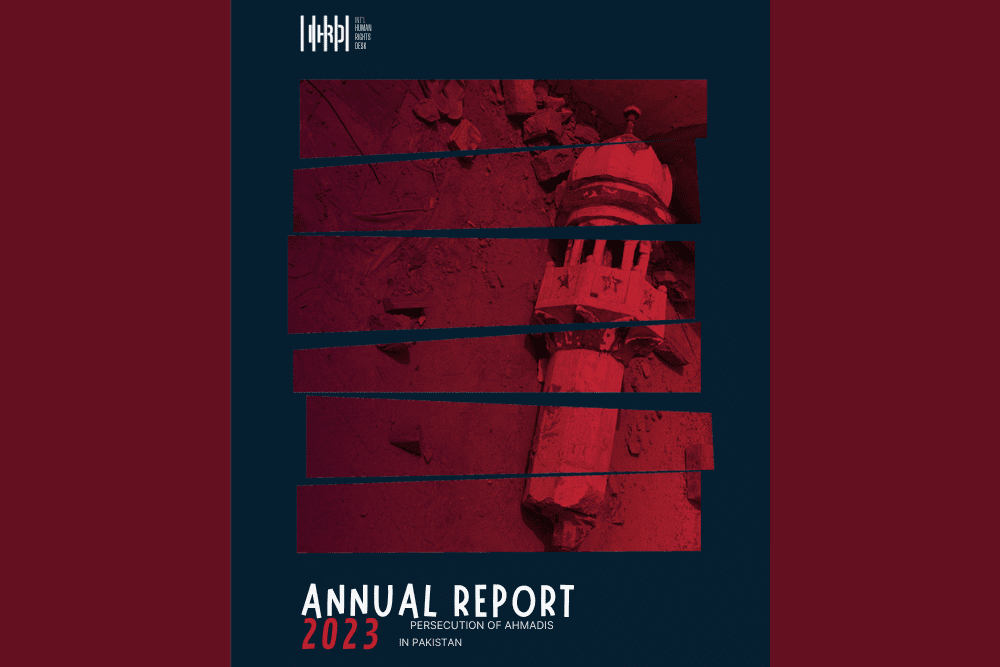By Thierry Valle CAP Liberté de Conscience May 2024
In Pakistan the Ahmadiyya Muslim Community, a minority group has long been facing discrimination, violence and rights violations. The inaugural annual report from the International Human Rights Desk (IHRD) founded by Hazrat Mirza Masroor Ahmad, the Head of the Ahmadiyya Community in November 2023 has highlighted the escalating persecution endured by Ahmadis in Pakistan and globally. This piece reviews the IHRDs findings from its Annual Report 2023 focusing on uncovering discrimination against Ahmadis and stressing the need for actions to address human rights abuses targeting the Ahmadiyya Community in Pakistan.
Key Findings from the 2023 Annual Report
The report by IHRD exposes trends in Ahmadis persecution in Pakistan throughout 2023. Incidents of desecration of Ahmadiyya places of worship have notably increased, with features like minarets and niches becoming points of contention. Despite commitments and international obligations concerning freedom of religion and belief Pakistani authorities have consistently fallen short in safeguarding Ahmadis rights.
Additionally the report sheds light on human rights violations suffered by Ahmadis during Eid ul Adha, including assaults false accusations leveled against them. Attacks, on their places of worship.Extremist groups, such, as Tehreek e Labbaik Pakistan (TLP) have made life harder for the community by barring Ahmadis from participating in their practices and creating an environment of fear and discrimination. The IHRD report underscores the rooted discrimination faced by Ahmadis in Pakistan. Laws like the Second Amendment to Pakistans Constitution and Ordinance XX specifically target Ahmadis severely restricting their freedom of religion and belief. The report urges for the repeal of these laws and the implementation of legislation to protect the rights of Ahmadis.
Ahmadis often find themselves arrested, prosecuted and imprisoned because of their beliefs. The anti-Ahmadi laws are frequently misused to oppress community members without reasons. Unjust denials of bail and harsh prison sentences handed down by the judiciary only add to their persecution. In 2023 133 Ahmadis were unfairly targeted, highlighting the need for reforms.
Moreover discrimination against Ahmadis persists in sectors like education, employment and business as detailed in the report. Ahmadi students have been expelled, assaulted, harassed, given exam questions and excluded from activities that violate their rights. Ahmadi professionals working in government roles face threats, intimidation and forced transfers due, to their beliefs. Additionally businesses owned by Ahmadis have been boycotted, attacked and socially isolated by groups.
The recent report, by the International Human Rights Defenders (IHRD) sheds light on the plight of Ahmadis in Pakistan highlighting concerns raised by human rights organizations worldwide. Both the 2022 U.S. State Department Report on International Religious Freedom and the Office of the High Commissioner for Human Rights (OHCHR) have expressed alarm over the treatment of Ahmadis in Pakistan calling for action to address human rights violations.
Despite facing criticism and disapproval the Pakistani government has largely overlooked pleas for action. The absence of dialogue and political initiatives has hindered progress in addressing discrimination against Ahmadis. The report underscores the necessity for leadership of effecting change to protect the rights of Ahmadis and promote a more inclusive and tolerant society.
The 2023 Annual Report from the International Human Rights Desk sheds light on the hurdles encountered by the Ahmadiyya Community in Pakistan unveiling a recurring pattern of persecution. It highlights instances of discrimination legal obstacles and widespread human rights abuses faced by Ahmadis across aspects of their lives. The communitys concerns and calls for action underscore the need to tackle this issue.
Efforts to address the persecution of Ahmadis in Pakistan collaboration among stakeholders and engagement, from the community.
The government of Pakistan must demonstrate a commitment, to upholding human rights principles by engaging in discussions and implementing measures to abolish discriminatory laws and protect the rights of Ahmadis. The global community should continue to exert pressure on Pakistan to fulfill its responsibilities under human rights agreements and hold them accountable for any failures in safeguarding the Ahmadiyya Community.
The findings from the IHRD report serve as a reminder of the actions needed to address human rights abuses against Ahmadis in Pakistan. It is essential that the recommendations and insights outlined in this report are taken seriously leading to actions that guarantee the safety and welfare of the Ahmadiyya Community within Pakistan and, beyond.







